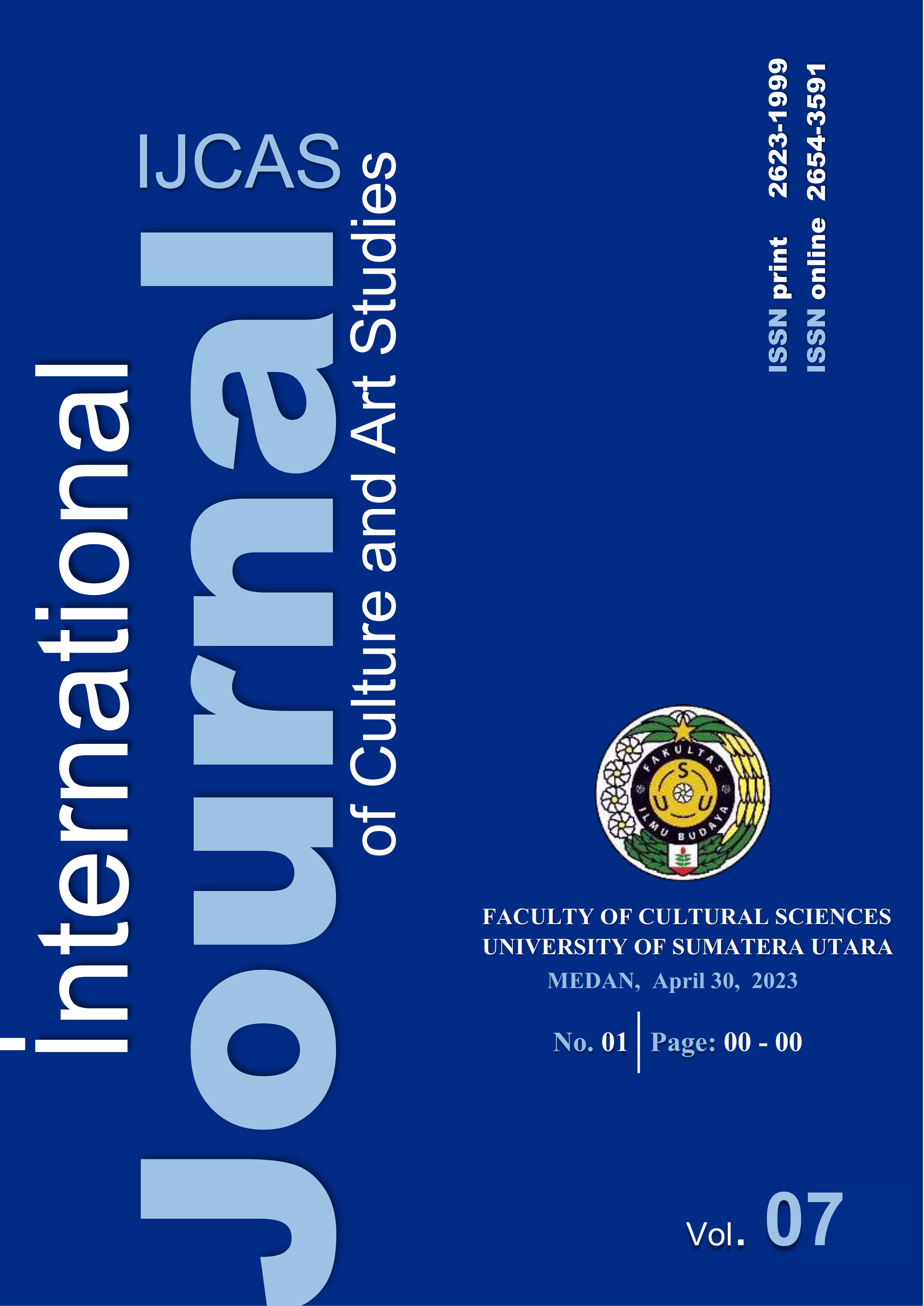Religious Identity Negotiation in Japanese-Indonesian Intermarriage
DOI:
https://doi.org/10.32734/ijcas.v7i1.11682Keywords:
Indonesian Wife, Intermarriage, Religious Negotiation, ReligionAbstract
This research is qualitative research using a life story approach. The informants of this study were seven Indonesian Muslim women and one Christian who married a Japanese man living in Japan. The study analyzes how religious identity is negotiated in the marriages of Japanese men and Indonesian women. The previous research informants were three Indonesian women who married Japanese people in Indonesia. The prior research indicates that all Japanese husbands follow the religion of their Indonesian wives. This study finds that all Japanese husbands, before marriage, follow the religion of their Indonesian wives. Still, after marriage, some continue to follow the informant's religion, while others return to their previous religion. Seven informants kept their religion, but one person converted to the religion of a Japanese husband. Two informants entered marriages with different religions. One informant who did not want to follow her husband's religion had a severe conflict because of the intervention of the informant's mother-in-law. Husbands generally do not question the religion of their wives, but disputes arise in cases where Japanese husbands adhere to a particular religion. The Indonesian wife's family and several Japanese husband's families also intervened in the religious negotiations. The religious change of Japanese men before marriage is initially more of a consideration for the smooth running of the marriage process. Research on intermarriages between Indonesians and Japanese is minimal. Research like this needs to be done because the number of intermarriages is increasing. This research brings valuable knowledge to prospective Indonesian and Japanese intermarriages.
Downloads
References
Hosie, S. (2018). Kawaritsudukeru Shuukyou. Gendai Nihon no Shuukyou Jijou. Toukyou: Iwanami Shouten.
https://www.dpr.go.id. (n.d.). Undang-undang Republik Indonesia Nomor 1 Tahun 1974 Tentang Perkawinan. Retrieved February 20, 2023, from https://www.dpr.go.id/dokjdih/document/uu/742.pdf
https://www.republika.co.id. (n.d.). Nikah Beda Agama Menurut Fatwa MUI, NU, dan Muhammadiyah. Retrieved January 9, 2023, from https://khazanah.republika.co.id/berita/dunia-islam/islam-nusantara/20/01/15/q44bao320-nikah-beda-agama-menurut-fatwa-mui-nu-dan-muhammadiyah
Igarashi, Z. M. (2014). Intimacy Crossroads: Turkish- Japanese Transnational Marriages Through Lenses of Culture, Religion, and Gender. Waseda University Repository. https://waseda.repo.nii.ac.jp/
Kai, H., & Sugimura, K. (2014). Nihonjin Daigakusei ni okeru Nihonhan Aidentiti, komittomento, manejimento Shakudo. Seinen Shinrigaku Kenkyuu. J-STAGE, 25, 125–136. https://www.jstage.jst.go.jp/article/jsyap/25/2/25_125/_pdf
Koji, O. (2008). Raifusutoorii Bunseki-Shitsuteki Chousa Nyuumon. Tokyo: Gakumonsha.
Kurasawa, O. (2013). Gendai ni Okeru no Kokusai Idou – Ajia no Naka no Nihon. Zainichi Musurimu Komyuniti to Higashi Nihon Daishinsai Hisaisha Shien. Tokyo: Bunmeisha.
Miller, J. (2003). Audible Difference: ESL and Social Identity in Schools. Multilingual Matters.
Mutou, K. (1979). Jigadou–Seichii Mensetsu no Kentou to Daigakusei no Jigadou. Seikyouiku Shinrigaku Kenkyuu (Vol. 27).
Nishitani, Y. (2022). Kazoku Kankei ni Okeru Fukusoutekihou Chitsujo wo Megutte. Idou to Kizoku no Houhouron – Henyousuru Aidentiti. Tokyo: Iwanami Shouten.
Rochmaniyah, A. F. (2018). Fluiditas Budaya dan Negosiasi Identitas Pasangan Perkawinan Campuran Indonesia dan Jepang di Surabaya. Universitas Airlangga, Surabaya.
Sakurai, A. (2002). Intabyuu no Shakaigaku: Raifusutourii no Kikikata. Toukyou: Serikashobou.
Shimada, N. (2008). Shuukyou. Nihon no Imin Kenkyuu Idou to Bunken Mokuroku II. Tokyo: Akashishoten.
Takahashi, N. (2013). Gendai ni okeru Hito no Kokusai Idou – Ajia no Naka no Nihon. Gaikokujin Shien kara Nihon no Imin to Shuukyou – Zainichi Burajiru to Kirisutokyou wo Chuushin toshite. Tokyo: Bunmeisha.
Takeshita, S. (1998). Kokusai kekkon ni taisuru Shakai no Kanyoudo. Kazoku Shakaigaku Kenkyuu. J-Stage, 10(2), 71–82. https://www.jstage.jst.go.jp/article/jjoffamilysociology1989/10/10-2/10_10-2_71/_pdf
Ting-Toomey, S. (2015). Identity negotiation theory. In J. Bennett (Ed.). Sage Encyclopedia of Intercultural Competence, 1, 418–422. https://www.researchgate.net/publication/303786152_Identity_Negotiation_Theory
Watado, I. (2010). Re-questioning the social reality of . (Y. Izawa, Ed.; p. 296). Tokyo: Akashishoten.
Yoshida, M. (2010). Ibunka Kekkon wo Ikiru – Nihon to Indonesia / Bunka no Sesshoku ・Henyou ・Saisouzou. Tokyo: Shinizumisha.
Yoshida, M. (2016). Ethnic Relations And Harmonious Coexistence Through Cross-Cultural Marriage: Itsnew Prospect In The Global Age. SOSIETAS, 6(2). https://ejournal.upi.edu/index.php/sosietas/article/view/4249/3067
Yoshimi, U. (2009). Filipina Intermarriage in Rural Japan: An Anthropological Approach. The London School of Economics and Political Science. https://core.ac.uk/download/pdf/46518827.pdf
Downloads
Published
How to Cite
Issue
Section
License
Copyright (c) 2023 Elisa Ulfah

This work is licensed under a Creative Commons Attribution-ShareAlike 4.0 International License.













